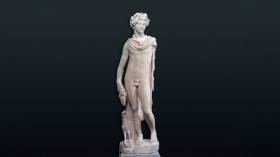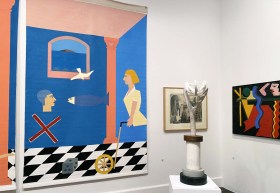Photo by Tyler Nix on Unsplash.
ArtsHub spoke to a number of educators and students to find out why some students thrive, while others may struggle. It turns out enjoyment is an important factor to a students’ success as it instils a motivation that is fuelled by their passion for learning.
It’s about the individual student experience
Graduate Kat Kohler, who recently completed a Master of Arts and Cultural Management at The University of Melbourne, said success is determined by the opportunities you have and the experiences these lead to.
‘The greatest value I achieved came from seeking opportunities like Contemporary Art in China, curating a project at the University’s George Paton Gallery, and since graduating, ACP PROJECTS and Arts West. These opportunities made me feel more prepared for my career and more confident,’ she said.
‘Success at university should be all about the individual student experience and the values gained. It is about each student’s unique personal and professional growth, their own learning journey.’
Read: Gain the qualifications you need to pursue a management career in the arts
Creating the best environment for creative learning
Building a culture that encourages students to come together to create is important. This is especially true in the creative arts, where collaborations are a necessary part of learning.
Mireille Oberholster, Coordinator of Interior Design at art and design school LCI Melbourne, said the environment plays an important role in facilitating this connection.
‘LCI Melbourne is where students develop their design and creative journey, form bonds and relationships with their peers along the way. Their classmates can become collaborators in future projects in industry so therefore we strive to create a positive creative environment for the students.’
The newly built Collingwood campus is purposely designed to do just that.
‘Our campus has space for the students to create and work in and out of the class. The students have an amazing break-out space where they can have some down time. We project movies during lunch in our atrium where students can watch on their break and even have student events (like Messina Gelato sessions in the summer),’ explained Oberholster.
‘In the classroom we diversify the types of learning environments for our students, we participate in real projects and meet industry and teach outside the classroom at design events, art shows and relevant excursions. I feel creating this type of dynamic environment is key to students feeling engaged and wanting to come week on week to see what’s in store next.’
Read: From behind the scenes at IKEA to exploring design through VR
Simulating industry practice
‘When higher education is collaborative and simulates industry practice, students can thrive and shine. Authentic learning is about recreating what students will experience in the workplace and makes them more employable,’ said Andrew Lewis, Associate Dean, Performance and an Associate Professor at the Western Australian Academy of Performing Arts (WAAPA).
‘If you do what you love and love what you do with likeminded individuals it creates an enjoyable environment. Most WAAPA students share a passion for the performing art and enjoy the collaborative atmosphere.’
But doing what you love doesn’t always mean it comes easy, and Lewis explained that ongoing support for WAAPA students who struggle is available so success is possible for everyone.
‘Counselling support and a lot of one-on-one pastoral care is provided to students which helps to maintain strong mental health for the elite performing artists. Terrific English language tutors are also provided for students requiring extra support,’ he said.
Read: What it’s really like to be an arts manager
Creating is serious fun
Just because a student is passionate and enjoys what they do, doesn’t mean it isn’t taken seriously.
As David Balfour, Head of Teaching and Learning at AFTRS, pointed out, ‘Connecting with your individual passion is a key part of all AFTRS courses – and enjoyment comes from that.’
‘Making screen and broadcast content can fun. But it is serious fun; we take what we do very seriously and it requires hard work and dedication to improve and grow.’
Passion can also be the circumstance that drives a student’s success — which includes a willingness to make mistakes.
‘Students who thrive at AFTRS arrive ready to study by being passionate storytellers open to engage with ideas and people in the collaborative creation of screen and broadcast projects. They must be ready to be challenged and to make mistakes in their journey to achieve their goals,’ said Balfour.
Read: AFTRS Open Day 2018 – Storytellers Wanted
Motivation comes from joy
When asked how important it is for students to enjoy their studies, Peter Eyers Head of Acting at The McDonald College, said ‘joy is extremely vital.’
‘A happy student is a motivated student. If I can relate it to us as adults, if we’re in a job which doesn’t seem like work and which we’re completely devoted to, then I think we’re extremely fortunate, and that’s the same with the kids. If they’re in an environment which is going to stimulate and allow them to grow, then learning just becomes second nature.’
As a performing arts school for students in year three to year 12, there is a strong focus on arts education at The McDonald College. But that doesn’t mean more traditional academic subjects are neglected in any way, and last year in 2017 the school ranked in the top 15% of all schools in NSW based on HSC results.
‘If students are studying a subject or have exposure to a subject which is going to excite them – whether that be in a sports school or a performing arts school – and have access to those subjects, then I think that’s only going to spill over into their academic studies,’ said Eyers.
‘I think McDonald College really caters for the individual. We have many different types of students here who all benefit from the relationship with each other. I think individuality is encouraged and the students blossom with that encouragement, so I think if a student is allowed to be themselves then that’s only going to enhance their learning.’
Read: Boutique performing arts school punches well above its weight
Empowering students to take ownership
The specialisation that comes with tertiary education in Australia throws students with similar interests together.
‘Students are given opportunities in university that they didn’t have in high school because university studies are more self-directed and specialised. At university students develop skills in critical thinking, problem solving and work-readiness, and they develop a high level of independence and gain ownership of their learning,’ said Associate Professor Eric Bouvet, Dean (Education), College of Humanities, Arts and Social Sciences at Flinders University, South Australia.
‘It’s very important for students to enjoy their experience at Flinders University because enjoyment leads to their well-being, which in turn motivates them to perform to the best of their abilities,’ he added.
As much as it is important for students to enjoy their studies, it is equally important that an education leads them to feeling confident and ready to move into the workplace.
‘In the course of their studies there will be challenging moments will test their resilience. If the students are well-guided and supported by staff, they will draw a sense of empowerment from the experience, which all contributes to a positive outcome for both the student and the university,’ said Bouvet.
Read: Shake up of Creative Arts leads to good things
Building resilience in artists
‘There is that special emotional impact of being an artist,’ said Barry Conyngham AM, Dean of the Faculty of Fine Arts and Music at The University of Melbourne.
‘It’s really terrific when you put your heart and soul into something and other people like it and get something out of it.’
But that emotional connection can also make artists vulnerable. Conyngham said that’s why student’s welfare is always front-of-mind.
‘We are always concerned about the welfare of our students because in a way, art students are giving of themselves a lot more – there’s a lot of passion and emotion in doing a creative arts process.’
‘I couldn’t think of a better word than joy to describe our education. I mean I’d like to think that all education has some element of joy, but it is that sort of emotional edge that I have to be honest and say that it is something that we also have to look out for – the downside of joy if you like is disappointment and emotional frustration, and I’m afraid artists are very emotional people – you’d know that I’m sure. They celebrate really well but they also can be knocked down and we’ve got to be there to help them develop resilience, and so we give them the tools to do that – it’s part of our program,’ he added.
Read: Spectacular investments at VCA and Melbourne Conservatorium Open Day
Laughing as you learn
The students who thrive in higher education are not always the ones who do the best at school, said Caroline Graham, Senior Teaching Fellow, Communication and Media at Bond University.
But they often have one thing in common – curiosity.
‘They are almost always curious and they sincerely enjoy learning (about new things, and themselves). They’re also ready for and open to the experience of higher education,’ she said.
This experience isn’t only relegated to the classroom, as Graham explained. ‘University is this incredible time to work out who you are, what you stand for and what you want from your life, so as well as prioritising study, I always encourage students to join clubs, sports teams and socialise to get the most from their time here.’
‘With all the noise of technology, it’s a luxury to be able to sit with other people and discuss ideas and consider new perspectives, and to spend time with the people who will be a life-long network of colleagues and friends.’
‘We know from the research that deep learning happens when students are engaged with content, but you only need to walk into a classroom to know that content stays with students for longer if they’re debating it, or putting it into practice, or laughing as they learn.’
Read: Channel your creative energies into a two year degree on the Gold Coast!
A family environment
NAISDA Dance College, Australia’s leading performing arts organisation for Aboriginal and Torres Islander students, takes a holistic approach to supporting students and keeping them engaged.
CEO Kim Walker said: ‘All those “closing the gap” issues are very real so we have to be aware of that and support them.’
‘Studying dance is hard, it’s a rigorous course, but our students and teachers all share that deep love of dance. It’s that love of dance that keeps them engaged. We also have a small student cohort, so every student is personally known and nurtured by the staff.’
Many of the students live on-site or nearby and each year, NAISDA travels to remote areas to dance on Country.
‘We have cottage accommodation on-site and home-stay accommodation close by for younger students, so students always have someone around and a family environment. We’re also connected to a lot of support services in the local area including health and mental health specialists and an injury management program for dancers. We also have staff dedicated to helping those students who need literacy and numeracy assistance for their academic work.’
Read: Naya Wa Yugali (We Dance): The future starts here for young Indigenous dancers
Rigorous and pleasurable
‘Things learnt in pleasure are remembered forever,’ said RMIT Associate Professor Mikala Dwyer.
‘Studying at the School of Art is rigorous, critical, scholarly but also playful … The friendships developed in art school endure and become important networks that can shape and revolutionise the future of thinking in a city and beyond.’
The impact of graduates on the world depends on the quality of education they experience and points to the value of the arts in shaping society. As Dwyer said, ‘An art education is invaluable and can be applied to any career and it can also be the one education that really works for people who have struggled throughout their studies in high school or with more academic tertiary courses.’
‘Students thrive at RMIT’s School of Art through the exciting and unique process of embodied learning that happens in a studio environment.’
Read: Open the door to your future at RMIT
Size matters
Deakin University knows a thing or two about student satisfaction. ‘Deakin has been number one for student satisfaction in Victoria for eight years running because we focus on meeting students’ needs and helping them to become great students,’ explained Professor Matthew Allen, Head of School, Faculty of Arts and Education at Deakin University.
Allen says it is in part because of a small program, which means more collaboration and feedback for students.
‘That [size] allows us to encourage and develop every student to find their particular voice, to say what matters to them, and then show them how to be proud of their work and to see the next level that they can go to,’ said Allen.
‘And we see it in the exhibitions and in the development of the work the students produce – they’re just so thrilled to be able to have a public showing of their work, to have critical but supportive friends, whether they’re students or other staff, the public who come. It’s those public exhibitions and performances that our students are required to do that allow them to experience the joy of creation,’ he added.
Read: The cutting edge course that welcomes flexible thinkers






